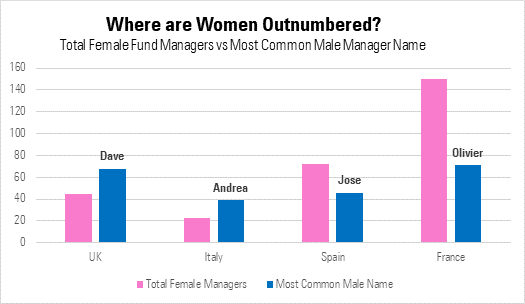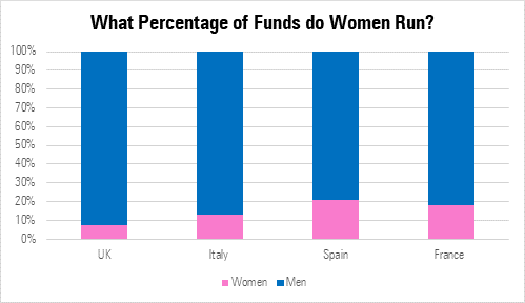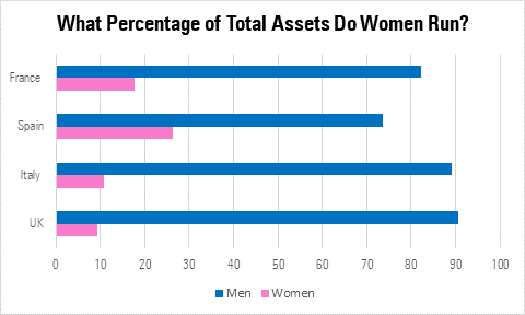
There are still more funds run by men called Dave than there are female managers in total, Morningstar analysis shows. Some 68 funds are run by men called Dave or David, but there is only a total of 45 female managers in the UK.
Ruli Viljoen, head of manager selection at Morningstar, says: “If 2020 is remembered as the year of a global pandemic, it might also be remembered as the year in which the rights of minority groups were brought to the fore. Gender equality is by no means a new topic and over the years we have seen many initiatives to level the playing field. But as a group, woman remain woefully underrepresented in the field of fund management.”
The 45 female fund managers in our UK analysis run a total of 95 funds between them, equivalent to just 7.7% of UK-domiciled funds in our sample – meanwhile, Daves run 5.5% of UK funds. The total assets of the UK funds we analysed was £475 billion, and women managed just £44 billion of this, around 9.3% of the total. By comparison, men named Dave manage £27.6 billion of investor cash in the UK.
Our analysis a year ago found that just 7.2% of UK-domiciled funds had a female manager at the helm, so while there has been some improvement over the past 12 months, women remain firmly in the minority in fund management.
We looked at the oldest share class and accumulation units only of UK-domiciled funds, excluding index funds. Discounting those where the manager’s name was not disclosed in Morningstar Direct, the sample encapsulated 1,226 funds.
Alexandra Jackson, manager of the Rathbone UK Opportunities fund, says: “7.7% is simply not good enough, is it? Fund management is a brilliant job, full stop, and it’s a brilliant job for women because it requires emotional intelligence, attention to detail, common sense and care.”
What About Europe?
While Dave might not be as common a name in other European countries, the same pattern, which finds female fund managers hugely outnumbered by men, persists across other European markets, our analysis found.

In Italy, there were 646 funds in our sample, with total assets of £121 billion. And while there are 39 funds run by men called Andrea, there are just 23 female managers in total. These women manage 81 funds between them, equivalent to 12.8% of the funds in our sample, with assets totalling just under £13 billion, some 10.7% of total assets.

In Spain, the number of female fund managers was significantly higher. Some 248 of the 1,187 funds in our sample had a female at the helm – equivalent to 20.9%. There were 72 individual female managers within this, running £59 billion of the total £223 billion of assets under management. The figures make Spain the most female-friendly country for fund managers within our cohort. The most common names among male managers in the country are Jose and Antonio, with 46 mandates run by each group. However, there are 72 funds run by women named Maria, the most frequently occurring name in our Spanish sample. Still, Marias only manage £11.9 billion of assets between them, compared to £18.9 billion for Joses.
Finally, we looked at France, which had the largest sample at 1,942 funds. Of these, some 352 had a female manager, equivalent to 18.1% of funds in the group. There were 150 individual female managers within this group, managing a total of £19 billion between them. Women run 18.1% of funds in our French sample and 17.7% of assets under management.
Supply or Demand?
Viljoen says the question is: are women underrepresented in the industry because of a lack of demand or a lack of supply? She adds: “On the demand side we definitely see evidence of change, with many companies now highlighting the need to increase gender diversity across their firms, and in some instances putting in place specific targets and milestones for this to be achieved within a given time-frame.”
On the supply side, says Viljoen, firms need to consider whether job descriptions are being written in a way that appeals to the widest possible audience. “It has often been said that if a female reads a job description, unless she thinks that she can do everything that is being asked of her, she may be put off from applying. In contrast, men are likely to apply if they can do 50% of the requirements,” she adds.
Jackson says there are signs of change, however, and teams of analysts and assistant managers now look more balances. However, she adds: “The culture of ‘star managers’ and ‘masters of the universe’ can be very off-putting, as well as being rather misleading. Excessive industry jargon and over-complexity is constructed to make the job appear harder than it needs to be, and I think this contributes to women being under-represented in what could be an ideal industry.”
While this year’s analysis shows some improvement, there is clearly a way to go. Some experts predict that the change in working habits and increasing acceptable of working from home could help to further level the playing field between men and women in the workplace. Viljoen says: “If there’s one change that might emerge from this pandemic it’s the potential for society to embrace more flexible work practices, which may help improve workplace diversity and potentially we will all be winners as a result.”




























